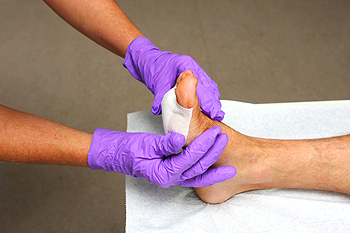Infections From Puncture Wounds
Tuesday, 28 February 2023 00:00
The feet, like almost all other parts of the human body, are susceptible to developing wounds. Wounds are the result of some kind of injury to the skin of the feet, and they come in many different types. Puncture wounds, for example, can develop on the feet when some kind of sharp object cuts through the skin on the feet. Everyone who wants to protect the health of their feet ought to be familiar with puncture wounds because it is possible for an individual to develop an infection. Infections can sometimes be a consequence of a puncture wound because, if it is left untreated, the object that caused the wound might have carried some damaging bacteria. If you have a puncture wound, it is suggested that you see a podiatrist who can help you keep it clean and free from infection.
Wound care is an important part in dealing with diabetes. If you have diabetes and a foot wound or would like more information about wound care for diabetics, consult with Dr. Eugenio Rivera from Calo Foot & Ankle Specialists. Our doctor will assess your condition and provide you with quality foot and ankle treatment.
What Is Wound Care?
Wound care is the practice of taking proper care of a wound. This can range from the smallest to the largest of wounds. While everyone can benefit from proper wound care, it is much more important for diabetics. Diabetics often suffer from poor blood circulation which causes wounds to heal much slower than they would in a non-diabetic.
What Is the Importance of Wound Care?
While it may not seem apparent with small ulcers on the foot, for diabetics, any size ulcer can become infected. Diabetics often also suffer from neuropathy, or nerve loss. This means they might not even feel when they have an ulcer on their foot. If the wound becomes severely infected, amputation may be necessary. Therefore, it is of the upmost importance to properly care for any and all foot wounds.
How to Care for Wounds
The best way to care for foot wounds is to prevent them. For diabetics, this means daily inspections of the feet for any signs of abnormalities or ulcers. It is also recommended to see a podiatrist several times a year for a foot inspection. If you do have an ulcer, run the wound under water to clear dirt from the wound; then apply antibiotic ointment to the wound and cover with a bandage. Bandages should be changed daily and keeping pressure off the wound is smart. It is advised to see a podiatrist, who can keep an eye on it.
If you have any questions, please feel free to contact our office located in Bellaire, TX . We offer the newest diagnostic and treatment technologies for all your foot care needs.









